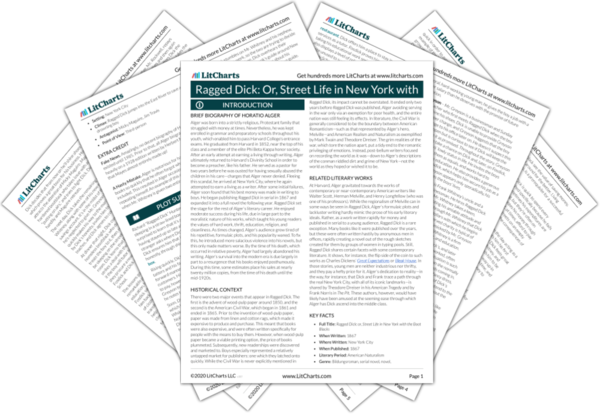Queen Victoria came to the British throne in 1837 and reigned until her death in 1901. Her remarkably long service was well established by the time of Ragged Dick’s writing in the late 1860s, and Dick references the Queen nearly a dozen times, and always in tandem with some other reference to obscene wealth. Dick, a homeless boy shining shoes on the streets, is himself surrounded by the incredible wealth of New York City, and feels the monarchy to be at the height of prestige in the world. Yet, Alger is quick to point out that this isn’t so. Through his illustration of New York City, Alger shows that the democracy of America has far outstripped the lush monarchial trappings of England—and it’s done so in a far more egalitarian way, since anyone might become rich in America, where wealth and social status are not simply inherited as Alger and Dick seem to feel they are in England; as Dick notes, “Victorian boys” are born with “a gold spoon, set with di’monds.” Democracy, then, is the one form of government which enables such ascendancy in its people.
The strongest proof of democracy’s superiority is in the strange editorial note that Alger supplies regarding the Fifth Avenue Hotel. Frank and Dick, encountering the famous building, both feel the hotel to be breathtakingly regal—worthy of Queen Victoria herself. The narrator, however, openly breaks in at this point to provide his opinion that the Fifth Avenue Hotel is, in fact, better than the Queen’s own palaces. He specifically mentions St. James’ Palace, the Queen’s previous residence, as being particularly ugly and factory-like (he neglects to mention that Queen Victoria seems to have felt the same way, since she moved the official royal residence from St. James’ Palace to Buckingham Palace decades earlier). He adds that “there are few hotels in the world as fine-looking as this democratic institution.”
As jarring as the narratorial interruption is to begin with, the association of the Fifth Avenue Hotel with democracy is even odder. What Alger seems to be suggesting in this association is that one must be born into royalty to stay at the comparatively shabby palaces of the monarchy, while one only need be able to foot the bill to stay at a grand location like the Fifth Avenue Hotel.
The Fifth Avenue Hotel was a real building and business—one of many such nonfictional elements highlighted by the story’s narrator. The restaurant named Delmonico’s, which Dick mentions always in a mindlessly adoring way, is another, and it also bolsters the claim that democracy enables its people to bootstrap their way to financial success. While Alger makes no direct connection between Queen Victoria and Delmonico’s, his readers might well have been aware that the restaurant often decorated its tables with edible sculptures of the Queen. This décor was for good reason. Even in a city like New York, Delmonico’s was notorious for its unapologetically upscale attitude, yet it was frequented by commoners, elites, and nobility—a distinctly democratic blending of patrons. The idea of ordering from a menu, instead of prix fixe, also originated at Delmonico’s. Previously, diners were largely forced to accept the meals the restaurant chose to prepare that day, with few options. This innovation mimics the democratic system: it allows its participants to choose from a wide variety of options, crafting their meals individually in the same way that a voter can choose from an array of candidates on a ballot. By voting, citizens in a democracy can help craft a nation in which they can succeed. Alger thus uses Delmonico’s as yet another example, like the Fifth Avenue Hotel, of an American model which surpassed the British one through the employment of democratic means.
While the references to Queen Victoria in Ragged Dick are surprisingly overt and cannot be overlooked, it’s important to realize that Alger champions democracy. However, he values democracy more for the way that it can level the playing field for capitalism. The monarchy, for instance, will always have its nobility who maintain their elevated status even when they lack money, a fact that Alger finds expressly unfair. Democracy removes this permanent advantage, Alger feels, enabling anyone to achieve success in their life, as long as they’re willing to work hard and live morally.
American Democracy vs. The British Monarchy ThemeTracker

American Democracy vs. The British Monarchy Quotes in Ragged Dick: Or, Street Life in New York with the Boot Blacks
Now, in the boot-blacking business, as well as in higher avocations, the same rule prevails, that energy and industry are rewarded, and indolence suffers. Dick was energetic and on the alert for business, but Johnny was the reverse. The consequence was that Dick earned probably three times as much as the other.
Turning towards our hero, he said, “May I inquire, young man, whether you are largely invested in the Erie Railroad?”
“Some boys is born with a silver spoon in their mouth. Victoria’s boys is born with a gold spoon, set with di’monds; but gold and silver was scarce when I was born, and mine was pewter.”
Though Frank did not know it, one of the queen’s palaces is far from being as fine a looking building as the Fifth Avenue Hotel. St. James’ Palace is a very ugly-looking brick structure, and appears much more like a factory than like the home of royalty. There are few hotels in the world as fine-looking as this democratic institution.
I’ll make a bargain with you. I can’t read much more’n a pig; and my writin’ looks like hens’ tracks. I don’t want to grow up knowin’ no more’n a four-year-old boy. If you’ll teach me readin’ and writin’ evenin’s, you shall sleep in my room every night.
“…you were ‘Ragged Dick.’ You must drop that name, and think of yourself now as—”
“Richard Hunter, Esq.” said our hero, smiling.
“A young gentleman on the way to fame and fortune,” added Fosdick.











